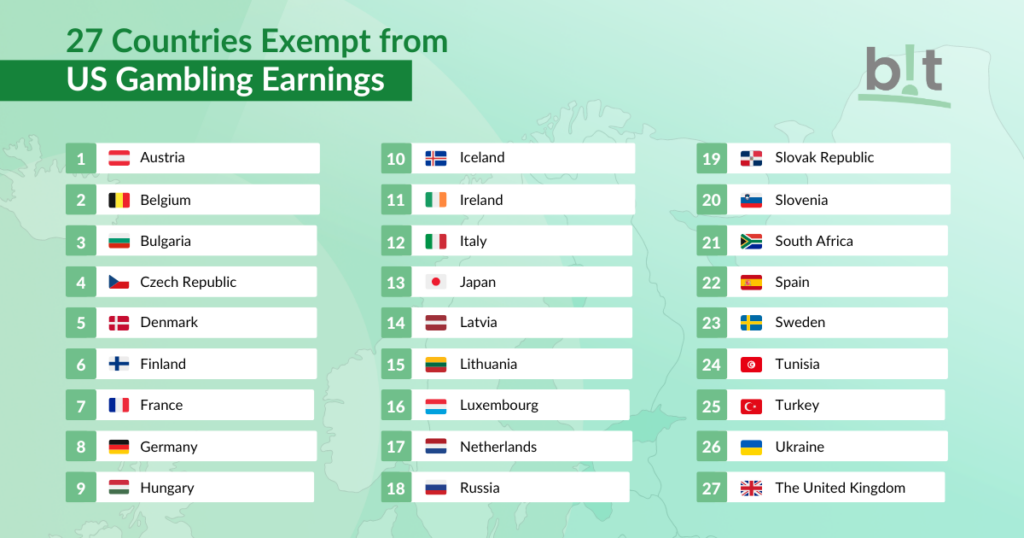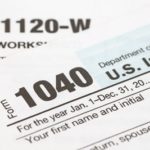Taxes on lottery winnings can significantly impact the financial outcome for lucky individuals who hold a winning ticket. For US expats who enjoy trying their luck in the lottery, understanding the implications of winning is especially important. US citizens and permanent residents residing outside the United States are still obligated to file an annual tax return with the Internal Revenue Service if they meet the minimum income threshold. This means that even an expatriate who wins the lottery must report their windfall on their US tax return.
The IRS requires detailed information about all sources of worldwide income, including lottery winnings. But, what is classified as lottery winnings, how much is it taxed, and what do you do if you win the lottery abroad? Conversely, what if you’re a foreign national who wins the lottery in the US? We dig into all this and more in this article.
What does the IRS consider lottery winnings?
Net lottery winnings are the total amount of winnings that remain after subtracting the cost of the lottery ticket. The exact amount of tax applied will depend on your tax bracket, which is based on the overall amount of income you have for the year.
How much tax does the IRS take from lottery winnings?
The IRS automatically withholds 30% of net lottery winnings in the US. The rate at which the net winnings are ultimately taxed though depends on the amount you won. The first winnings up to $599.99 are tax-free, with winnings above that amount required to be reported on your upcoming tax return.
At the highest tax band, winnings may be taxed by as much as 38%. However, there are strategies you can implement to buffer your winnings from IRS. One common strategy is to elect for your winnings to be paid out in distributions over an extended period of time – this will effectively result in an overall lower tax liability.
💰 Keep in mind for a larger payout:
Although winning the lottery is exciting, it is best to avoid a lump-sum payout in the case of high winnings. If you receive a large winnings payout as a lump sum, you leave your money vulnerable to higher tax rates by the IRS.
Are foreign lottery winnings taxable by the US?
While the IRS automatically withholds tax on US lottery winnings, they won’t do the same for foreign lottery winnings. That doesn’t mean they don’t need to be reported on your US tax return though. Any gambling winnings, which include foreign lottery prizes, are subject to the same graduated tax rates that apply to your other income. Whether you’ll have additional taxes to pay has nothing to do with the country in which you won the lottery. Instead, it depends on how much the lottery winnings are and the other types of income you report.
Strategies to minimize taxes on foreign lottery winnings
If you win the lottery abroad, you need to report that income on your US expat tax return. Assuming that you reside abroad and are a tax resident of a foreign country, you will likely pay taxes on the lottery winnings first to the foreign country. After, you may take the Foreign Tax Credit to offset your US tax liability for the lottery winnings.
Pro tip:
You cannot use the Foreign Earned Income Exclusion (FEIE) to exclude lottery winnings from taxes. The reason is that the FEIE only applies to earned income, such as salary wages.
How to report lottery winnings on federal taxes
When you win a qualified US lottery, you will be issued Form W-2G: Certain Gambling Winnings. Foreign lottery winnings will not be reported on a standard US tax form, and how they are reported will vary depending on the foreign country. US Citizens and Green Card holders report their winnings on a 1040 or Form 1040-SR. Nonresident alien US lottery winners, however, will report via Form 1040-NR.
Deducting US-based gambling losses on US expat taxes
Gambling losses can be deducted by amateur gamblers who choose to itemize their gambling losses.1 These itemizations are claimed on Schedule A. However, you will not have the opportunity to deduct gambling losses if you claim the standard deduction.
If you’re a professional gambler, on the other hand, gambling losses (and winnings) should be reported on Schedule C: Profit or Loss from Business.
You cannot deduct gambling losses that amount to more than the winnings you report on your return. For example, if you won $100 on one bet but lost $300 on a few others, you can only deduct the first $100 of losses. If you had no gambling winnings for the year, you won’t be able to deduct any of your losses.
When reporting gambling losses, careful bookkeeping is important. According to the IRS, “to deduct your [gambling] losses, you must be able to provide receipts, tickets, statements or other records that show the amount of both your winnings and losses.”
Foreign lottery winnings may also trigger FBAR filing
If your gambling winnings amount to larger amounts and you deposit them into a foreign account, you’ll need to keep in mind the US reporting requirements regarding holding monies in foreign accounts. The Foreign Bank Account Report, (FBAR), is required when the total balance in one or more foreign financial accounts reaches $10,000 or more. The foreign account might be a checking, investment, or pension, and the balances of each count toward the $10,000 threshold.
In order to determine whether you are required to file an FBAR, you must also add up the highest balances in each foreign financial account on which you have signatory authority.
A quick example:
Jess is a US expat living in France. She won the lottery and opted for annuity payments. The first payment arrives in her US Schwab account as a deposit worth $14,000. She converts the money to Euros and sends it to two locations – her personal checking account with the French bank CIC, and the joint checking account she shares with her partner through his bank, BNP Paribas. She deposits the equivalent of $5,000 into her CIC account and the equivalent of $9,000 into the joint BNP Paribas account. Question for you, reader: does Jess need to file an FBAR?
The answer is yes. The reason is that she must add up the total maximum held by each foreign account.
Note: This example has been simplified for clarity. In real life, Jess would have lost some of the money in currency conversion and transfer fees.
Tax on lottery winnings by state
Many US expats retain US state residency, which is important to keep in mind if you win the lottery. The reason for this is that states tax lottery winnings at different rates. New York, for example, taxes the most at up to 13%.
Generally, states that impose an income tax charge between 2.9%-8.82%. There are nine states that do not impose an income tax, which means you’re off the hook for state taxes on your lottery winnings if you’re registered in any of the following states:
- Alaska
- Florida
- Nevada
- New Hampshire
- South Dakota
- Tennessee
- Texas
- Washington
- Wyoming
💡 Pro tip:
In addition to the states with zero income tax, despite having a general income tax California and Delaware do not impose a state tax on lottery winnings.
Do foreigners pay taxes on US lottery winnings?
US lottery winnings and gambling prizes are subject to taxation at source. This means that taxes on winnings won by foreign nationals playing the lottery in the US are deducted directly by the lottery organization, the federal government, and the state where the lottery ticket was purchased.2
Important callout: Certain gambling winnings are exempt from US tax, including blackjack, craps, baccarat, roulette, or big six wheel.3
Non-US residents who win the national lottery will be subject to a 30%-38.8% withholding rate if winnings exceed $599.99.4
That said, there are select countries that have a tax treaty with the United States that will reduce withholding tax.
The nationals of these countries are exempt from US tax on gambling winnings

How to claim tax-exempt status for your US lottery winnings as a foreign national
If you are a national of one of the listed countries when you win the US lottery, you must present Form W8-BEN to the withholding agent or payer in order to claim your US tax exemption.
Note: Do not send Form W8-BEN to the IRS.
References







